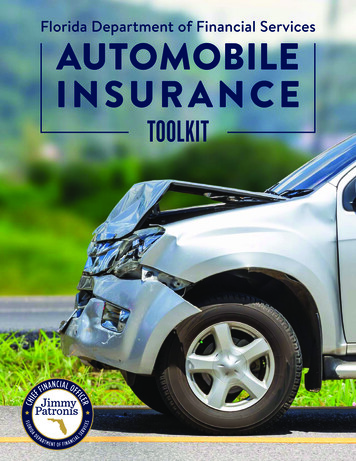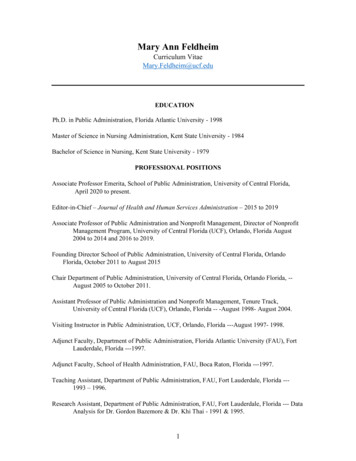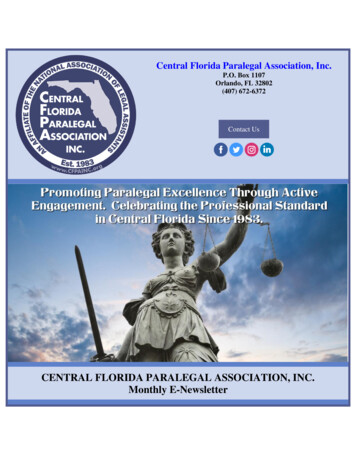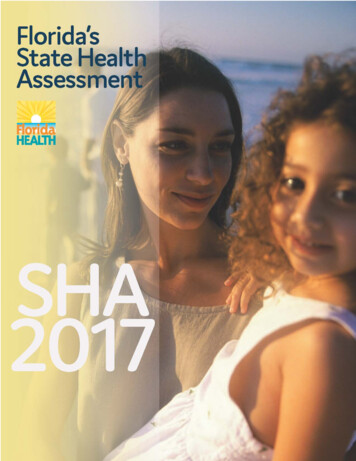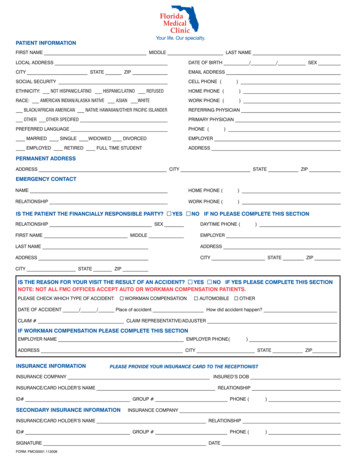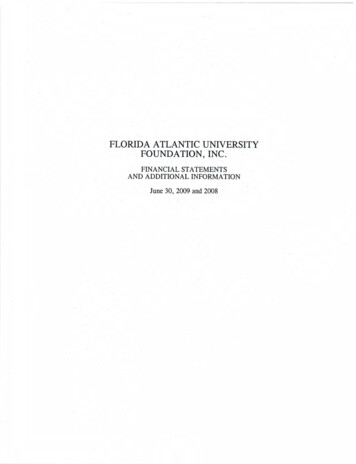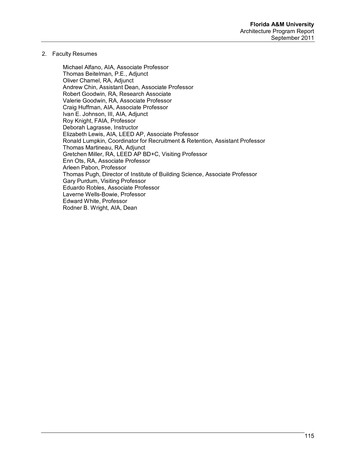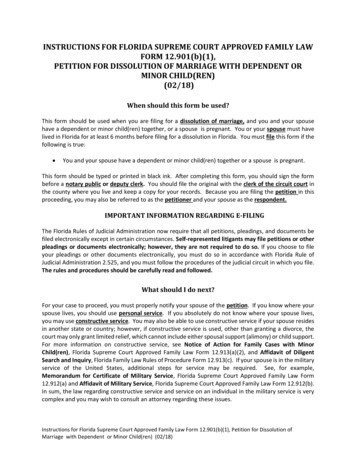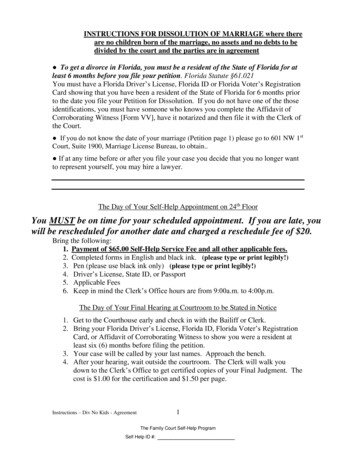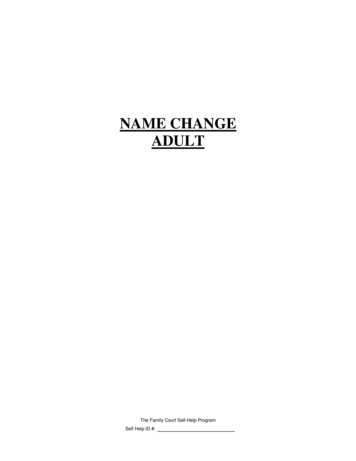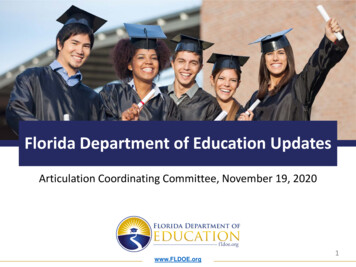
Transcription
Florida Department of Education UpdatesArticulation Coordinating Committee, November 19, 2020www.FLDOE.org1
AgendaOpening Chancellor Henry Mack – SBOE Strategic PlanUpdate on Library and Distance Learning/Student ServicesNCES Updates to 6-digit CIP CodesStatewide Workgroup on CIP to SOC AlignmentAssociate in Science (AS) General Education WorkgroupsAS to BS Articulation Agreements Review and UpdatesAlternative Methods for Dual Enrollment Eligibility andDevelopmental Education Placement Statewide Course Numbering System Clean-Up www.FLDOE.org2
Opening – SBOE Strategic PlanHenry MackChancellorDivision of Career and Adult Educationwww.FLDOE.org3
Goal 2 Seamless Articulation and Maximum AccessMeasure 4 (Choice) – Access to Choice – Number of students exercising choice options, by en er Schools251,736270,870283,694295,748313,532Private ,98197,36492,256135,473136,350135,903134,910Tax Credit Scholarships69,95078,66498,936108,098104,091Home Education84,09683,35987,46289,81797,261AICE Programs26,90032,91741,40249,18355,119McKay Scholarships (Private)28,26329,22029,91629,12029,072District Choice and Magnet ProgramsCareer and Professional Education AcademiesPrivate School/Center VPK Enrollment134,521McKay Scholarships (Public)3,4673,9224,3225,1345,636Full-Time Virtual Instruction11,79013,34612,98412,28611,175IB Programs12,74613,33513,60313,67013,575Gardiner Scholarships1,5704,9338,04710,25811,917Lab Schools (1 FAU school, UF, and FAMU)2,6672,7302,7972,8862,935Charter Lab Schools (FSUS and 1 FAU school)3,7993,8323,8353,8133,856Lab Schools and Charter Lab Schools6,4666,5626,6326,6996,791School Transfers Related to Low-Performing 952,7012,8222,8672,936169,297172,276176,457APDual EnrollmentCollegiate Charter HSSpecial Education (Gifted enrollment)Family Empowerment Scholarshipwww.FLDOE.org4
Goal 2 Seamless Articulation and Maximum AccessMeasure 5 (Postsecondary) – Florida Postsecondary Continuation Rate – Percent of high school graduates who enroll in postsecondary educationNote: Approximately 4-7% of students go out of state which is not captured by this dataGoal 2 Seamless Articulation and Maximum AccessMeasure 6 (Postsecondary) – Associate Degree Articulation Rate in Florida – Percent of students earning an Associate of Arts (AA) degree whotransfer to the next postsecondary level in FloridaNote: Does not include articulation to out-of-state postsecondary institutions.AA Articulation RateNumber of Transferring StudentsNumber of AA GraduatesBaseline2014-15(2013-14AAgraduates)Year 12015-16(2014-15AAgraduates)Year 22016-17(2015-16AAgraduates)Year FLDOE.orgYear aduates)66.7%2024Target 12024Target 22024Target 367%73%90%5
Update on Library and DistanceLearning/Student ServicesKathy HebdaChancellorDivision of Florida Collegeswww.FLDOE.org6
Integrated Library, Distance Learning andStudent Services The Board of Governors (BOG) and the Florida Departmentof Education (FDOE) sought Statements of Interest fromState University System and/or Florida College Systeminstitutions to provide essential and centralized services forlibraries, distance learning and student services, which werecompiled based on input from both systems. Using a competitive process, Florida State University wasselected as the new host to provide the services. The smooth transition of the services from the University ofWest Florida to the new host is anticipated to be completedin early December with no interruption to services.www.FLDOE.org7
NCES Updates to 6-digit CIP CodesKathleen TaylorChief of Standards, Benchmarks and FrameworksDivision of Career and Adult Educationwww.FLDOE.org8
2020 Lower Division CIP Transition andDeployment NCES released the 2020 Classification of Instructional Programs (CIP)last year, which reflects the various programs of study being offered atpostsecondary institutions around the country. The Division of Career and Adult Education maintained the existing 2010CIPs (Florida’s 10-digit CIPs, which includes the 6-digit federal CIP) in the2020-2021 curriculum frameworks and announced to school districtsand FCS institutions that deployment of 2020 CIPs would be reflected inthe 2021-2022 curriculum frameworks. On the upper division side, the Division of Florida Colleges hasalready engaged the Florida College System (FCS) on the 2020 CIPassignments for workforce baccalaureate degrees. This fall (October-November timeframe) school districts and FCSinstitutions can review and provide feedback on recommended lowerdivision 2020 CIP code assignments for all program types (careercertificate, ATD, CCC, AAS, and AS).www.FLDOE.org9
Statewide Workgroup on CIP to SOCAlignmentDr. Carrie HendersonExecutive Vice ChancellorDivision of Florida Collegeswww.FLDOE.org10
CIP to SOC Workgroup The Florida Talent Development Council has identified the needfor improved alignment across the workforce and educationsystems in how we translate industry demand to education andtraining needs. One of the strategies developed by the data workgroup to meetthis need is to “modify the national Classification of InstructionalPrograms (CIP) to Standard Occupational Classification (SOC)crosswalk to align with Florida secondary and postsecondarycredentials and implement as statewide standard.” The CIP to SOC crosswalk is important because it links programsto specific occupations, allowing for a better understanding ofhow the state's education systems are meeting our local and stateworkforce needs.www.FLDOE.org11
CIP to SOC Workgroup The Department of Economic Opportunity has organizeda workgroup composed of staff representingdistrict postsecondary, ICUF, CIE, FCS and SUS institutions. Using the NCES CIP 2020 to SOC 2018 crosswalk as thefoundation, the intention of the workgroup is to adopt aState of Florida CIP to SOC crosswalk. We anticipate supplementing the federal crosswalkto include: Linking occupations that do not appear on the federal crosswalk toprograms based on institutional program learning outcomes. Identification of primary SOC codes. Clarification of education level required for occupations (e.g.,certificate, associate, baccalaureate, etc.)www.FLDOE.org12
Associate in Science (AS) GeneralEducation WorkgroupsKathleen TaylorChief of Standards, Benchmarks and FrameworksDivision of Career and Adult Educationwww.FLDOE.org13
AS General Education Workgroup Update Workgroup Charge: Explore issues surroundinggeneral education coursework in the AS degree—one that considers the role it should play within thedegree itself and the role it plays in facilitatingtransfer to the baccalaureate degree level in bothFCS institutions and universities. Deliverables: A set of recommendations forstatewide AS general education requirements to bepresented to the FCS Councils during the Junemeeting and then sent to FDOE senior leadershipand Commissioner Corcoran for furtherconsideration and action.www.FLDOE.org14
AS General Education Workgroup Update Status: After pausing the work in the wake of theCOVID-19 crisis, the workgroup re-engaged overthe summer. After exploring the related issues, thegroup is currently considering potentialrecommendations to be shared with the FCSCouncils.www.FLDOE.org15
AS to BS Articulation AgreementsReview and UpdatesDr. Carrie HendersonExecutive Vice ChancellorDivision of Florida Collegeswww.FLDOE.org16
AS to BS Articulation Agreements Florida currently has 11 career ladder agreements thatprovide for transfer for associate in science (AS) graduatesinto university baccalaureate degree programs. Radiography, Nursing, Hospitality & Tourism Mgmt., Electronics EngineeringTech., Business Administration, Criminal Justice Tech., ComputerEngineering Tech., Construction Tech., Graphics Communication Tech.,Drafting and Design Tech., Transportation Tech. The current agreements have not been revisited in severalyears, and there are not data regarding the usage of thesearticulation agreements. We are in the process of determining which articulationagreements need to be updated and would like to explore ifthere is a need to create new statewide agreements.www.FLDOE.org17
AS to BS Articulation Agreements The Division of Florida Colleges recently conducted anenvironmental scan of local agreements between statecolleges and state universities via a survey of the 28 FCSinstitutions. Twenty-six (26) of the 28 colleges responded. Twelve (12) colleges reported having at least oneestablished AS-to-baccalaureate articulation agreementwith a state university. Between those 12 colleges, there are a total of 28 articulationagreements. Of those colleges who do not have establishedagreements, three colleges are currently developing anagreement with a state university.www.FLDOE.org18
AS to BS Articulation Agreements The most common AS-to-baccalaureate programarticulation agreements included: AS in Paralegal Studies to a BS in Legal Studies. AS in Hospitality and Tourism to a BS in Hospitality Administration. FCS institutions noted several barriers in establishing AS toBS/BAS agreements. Difficulties with creating agreements that do not exceed 60 transfercredit hours. General education transfer requirements do not always align withAS degree requirements. The focus of AS graduates has been on finding employment, not ontransferring to continue their education.www.FLDOE.org19
AS to BS Articulation Agreements Based on the survey responses, the FDOE willcollaborate with the BOG to evaluate possiblestatewide agreements with the assistance of FCSand SUS faculty. These agreements would be presented to theArticulation Coordinating Committee for reviewand approval.www.FLDOE.org20
Alternative Methods for DualEnrollment Eligibility andDevelopmental Education PlacementDr. Carrie HendersonExecutive Vice ChancellorDivision of Florida Collegeswww.FLDOE.org21
Temporary Waiver of Common PlacementTest Requirements For dual enrollment initial placement through December 31,2020, the common placement testing requirement wassuspended. In addition to the 3.0 GPA requirement, FCSinstitution boards of trustees could establish additionaleligibility requirements to ensure student readiness forpostsecondary instruction. For developmental education placement, through fall 2020,the requirement that colleges must use tests wassuspended. FCS institutions could use common placementtests or alternative methods, such as GPA, workhistory, military experience, etc.www.FLDOE.org22
Sample of Alternative Methods andMinimum Standards for Course Placementwww.FLDOE.org23
Ad Hoc Data Collection The FCS, in partnership with participatinginstitutions, intends to explore the effect removingthe common placement testing requirement has on studentaccess and student success in postsecondary coursework. Are there defining characteristics of students placed usingalternative methods? How do students placed using alternative methods perform in firstterm coursework? Several colleges have opted into a voluntary ad hoc datacollection. Six colleges are participating in dual enrollment. Four colleges are participating in developmental education. Spring 2021 is the target date for dissemination of findings.www.FLDOE.org24
Ad Hoc Data Collection – Preliminary InsightsBenefits Flexibility to choose avariety of options Increase in access No incurred test cost Removed element oftest anxietyChallenges Difficulty pivoting toalternative methods Ensuring consistencycollege-wide More time-consumingprocesswww.FLDOE.org25
Statewide Course Numbering SystemClean-UpElizabeth MoyaAssistant Vice Chancellor, Articulation and CareerEducation PolicyDivision of Career and Adult Educationwww.FLDOE.org26
Statewide Course Numbering System(SCNS) Clean-Up Pursuant to Florida Statute 1007.24(8), the FDOE is asking all institutioncontacts at all SCNS-participating institutions to discontinue coursesthat they are no longer offering in the SCNS Database. The FDOE, BOG, and ICUF are working on a process to assist institutions. Please keep in mind that even when the last college discontinues acourse in SCNS, that course will stay in the SCNS taxonomy for five years.Colleges, at any time in that five-year window, can reinstate the coursenumber that was discontinued. A course number will not be lost during the five-year period. This may be a large task in the first year. However, once this process isundertaken, institutions should continue to revisit this processthroughout the year, to keep the SCNS and institution course catalogscurrent.www.FLDOE.org27
Department of Education ContactsKathy HebdaChancellorDivision of FloridaCollegesKathy.hebda@fldoe.orgDr. Carrie HendersonExecutive Vice ChancellorDivision of Florida CollegesCarrie.henderson@fldoe.orgHenry MackChancellorCareer and Adult EducationHenry.mack@fldoe.orgTara GoodmanVice ChancellorCareer and Adult EducationTara.goodman@fldoe.orgElizabeth MoyaAssistant Vice ChancellorArticulation and Career rg28
Lab Schools (1 FAU school, UF, and FAMU) 2,667. 2,730 2,797 2,886. 2,935. Charter Lab Schools (FSUSand 1 FAU school) . programs based on institutional program learning outcomes. . AS in
